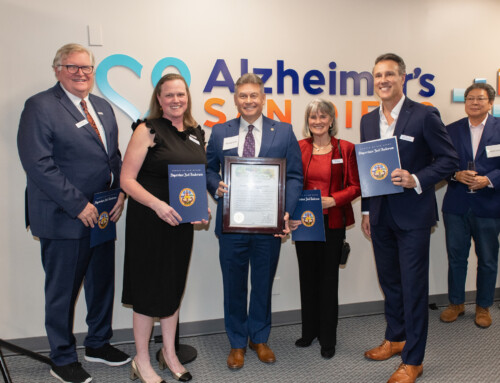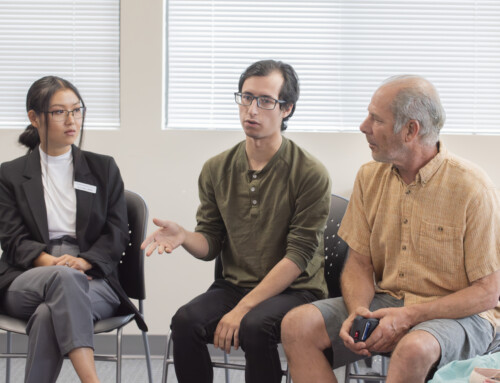
When a person notices changes in their memory, often their first thought is of dementia. However, there are many “pseudo dementias, ” or conditions that are often mistaken for dementia, including mental health issues like depression, anxiety, and post-traumatic stress disorder (PTSD). We’ll discuss similar symptoms of each and how to tell the difference.
Overview of Symptoms
Common Symptoms of Dementia
- Memory loss
- Poor judgment leading to bad decisions
- Loss of spontaneity and sense of initiative
- Social withdrawal
- Taking longer to complete daily tasks
- Repeating questions
- Trouble handling money and paying bills
- Wandering and getting lost
- Losing or misplacing things in odd places
- Mood and personality changes
- Increased anxiety and/or aggression
- Changes in eating and/or sleeping
Common Mental Health Symptoms
Depression
- Sad or “empty” mood
- Irritability or anxiety
- Loss of interest in once pleasurable activities
- Decreased energy or fatigue
- Sleeping or eating problems
- Moving or talking slowly
- Trouble concentrating or making decisions
- Thoughts of death or suicide
Anxiety
- Feeling nervous or restless
- Fear or sense of danger
- Rapid heart rate/breathing
- Sweating or trembling
- Feeling weak or tired
- Trouble concentrating
- Trouble sleeping
- Stomach upset
- Avoiding situations that trigger anxiety
PTSD
- Frequent intrusive memories
- Fear and anxiety
- Sleep issues and nightmares
- Memory loss (especially about the traumatic event)
- Trouble concentrating
- Irritability or anger
- Loss of interest in once pleasurable activities
- Emotional numbness
Effects of Stress and Grief
Stress and grief can cause mental and physical effects. Stress can result in restlessness, problems with sleeping or eating and lack of motivation or focus. Feeling irritable, tense, or depressed are common effects of stress. Grief can cause feelings of sadness or anger and problems with concentration, sleep, and appetite. Social withdrawal and difficulty with daily activities are also common effects of grief.
Similarities & How to Tell the Difference
Dementia and mental health concerns share some symptoms that can make them difficult to tell apart. Memory issues are one of those symptoms. Negative thoughts and emotions due to mental health issues can consume one’s attention. This can make it difficult to concentrate and remember things like appointments. This increased forgetfulness can look like dementia. More shared symptoms include mood changes and problems with eating and sleeping.
There are a few key differences between dementia and mental health issues. Dementia symptoms progress slowly and there is usually no clear starting point. In conditions like PTSD symptoms begin quickly after a difficult or traumatic experience. Mental health issues rarely cause disorientation or major personality changes common with dementia. Memory problems also differ in subtle ways. Dementia physically damages the part of the brain responsible for short-term memory. This leads to forgetting events from earlier in the day or repeating the same question often. Things that are forgotten are not usually remembered later. Memory issues caused by mental health conditions are usually due to problems with concentration or focus. With these conditions the forgotten information may be remembered later. About half of the people living with dementia do not recognize changes in their memory. People with mental health issues are more likely to be aware of their challenges and can discuss them.
Getting Support
The presentation of dementia and mental health concerns may be similar. People with memory concerns should be assessed by a health care professional for an accurate diagnosis. A primary care doctor can conduct further testing or provide a referral to a specialist.
Mental health conditions can be treated with medication, talk therapy, or a combination of both. Lifestyle changes, such as regular exercise, can also help. Once the problem is treated, memory issues tend to resolve. Although there is no cure for dementia, getting an early diagnosis can allow a person to begin medication that can slow symptom progression. Lifestyle changes like exercise, eating a heart healthy diet, and staying socially engaged can also be beneficial.
If you are having thoughts of hurting yourself, help is available 24 hours a day, 7 days a week. Call the San Diego Access and Crisis Line at 888-724-7240 or the National Suicide Prevention Lifeline at 800-273-TALK (800-273-8255) for support from a mental health professional.
For personalized dementia support, call us at 858.492.4400 to speak with one of our Dementia Care Coaches who are here to help San Diego County residents and/or those caring for someone living in San Diego County (Spanish speakers available). Also check out our free education classes, social activities, caregiver support groups, & more.
RECOMMENDED: Effective Ways to Calm Paranoia in People with Dementia
Posted on July 31st, 2025






